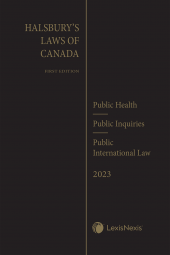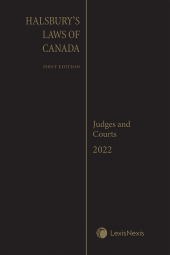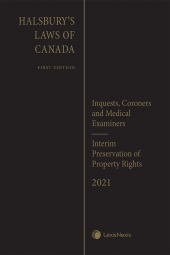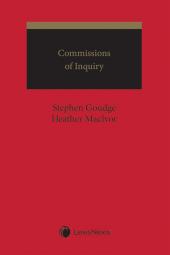Commissions of Inquiry
One Year Subscription Only Terms
Subscribers receive the product(s) listed on the Order Form and any Updates made available during the annual subscription period. Shipping and handling fees are not included in the annual price.
Subscribers are advised of the number of Updates that were made to the particular publication the prior year. The number of Updates may vary due to developments in the law and other publishing issues, but subscribers may use this as a rough estimate of future shipments. Subscribers may call Customer Support at 800-833-9844 for additional information.
Subscribers may cancel this subscription by: calling Customer Support at 800-833-9844; emailing customer.support@lexisnexis.com; or returning the invoice marked 'CANCEL'.
If subscribers cancel within 30 days after the product is ordered or received and return the product at their expense, then they will receive a full credit of the price for the annual subscription.
If subscribers cancel between 31 and 60 days after the invoice date and return the product at their expense, then they will receive a 5/6th credit of the price for the annual subscription. No credit will be given for cancellations more than 60 days after the invoice date. To receive any credit, subscriber must return all product(s) shipped during the year at their expense within the applicable cancellation period listed above.
Détails des produits
"This publication is a true treasure for anyone seeking to begin their understanding of commissions of inquiry or those who wish to refine and refocus their efforts to inaugurate this most important tool in the arsenal of government innovation."
Reviewed by Paul F. McKenna, Lecturer
School of Information Management, Dalhousie University
See Review in 2020 Canadian Law Library Review 45:3 (page 15-16)
Comprehensive and informative
As noted in the preface to this volume, “Commissions of inquiry have been a part of the Canadian experience since before Confederation.” Public inquiries of various kinds have profoundly affected Canada’s history and society, from Lord Durham’s Report in the 1840s to the delivery of health care in the 21st century. Commissions of Inquiry summarizes the history and evolution of Canadian inquiries and provides a detailed analysis of their current role and procedures. It emphasizes the rights and duties of inquiry participants; the variety and flexibility of public inquiries as a tool for investigation and policy-making; the exceptional powers and discretion vested in Commissioners and their staff; and the growing impact of judicial review on their work. The book casts new light on such perennial concerns as transparency, accountability, public participation in policy-making, and healing for people affected by tragic events.
The expert authors draw upon their years of experience and extensive knowledge to provide insight into the world of public inquiries. Specifically, they offer:
- Practical information on conducting an inquiry – choosing Commissioners and counsel, researching and gathering information, and drafting the final report and recommendations
- Significant comparative analysis, including the historical evolution of Royal Commissions and statutory inquiries in Britain, Australia and New Zealand and parallel developments in some Canadian provinces
- A comprehensive picture of the law pertaining to Commissions of Inquiry: the constitutional framework, the principles of procedural fairness and natural justice, enabling statutes, Terms of Reference, Inquiry Rules of Practice and Procedure, and Commissioners’ rulings
- Recent trends in information-gathering: proportionality, efficiency and cost-effectiveness
- An up-to-date synthesis of the secondary literature on Commissions of Inquiry and related topics in public law
- Narratives of selected inquiries, to put the legal and historical information in context
A go-to publication
Written in accessible language, with comprehensive appendices providing sample terms of reference, inquiry rules of procedure, and Commissioners’ rulings and orders, Commissions of Inquiry is an essential resource for:
- Public servants, especially those involved in the inquiry process or tasked with implementing inquiry recommendations
- Cabinet Ministers considering whether to appoint a public inquiry and how to craft the Terms of Reference
- Sitting or retired judges who are asked to serve as Commissioners, and the Chief Justices who must advise on their appointments
- Legal practitioners, whether employed by Commissions of Inquiry or representing inquiry participants
- Policy experts engaged in Commission research
- Private citizens called to testify at an inquiry or wishing to understand how inquiries work
- Law students and political science students studying administrative law or public policy
- Law libraries who want to provide a comprehensive collection of resources for their patrons
Table des matières
Part I An introduction to Commissions of Inquiry
Chapter 1 An overview of public inquiries
1. What is a Commission of Inquiry?
2. What does a public inquiry do?
3. The flexibility of inquiries
4. Inquisitorial vs. adversarial
5. Alternatives to public inquiries: Considerations for governments
6. The legal framework
7. A note on nomenclature
Chapter 2 Two types of inquiry
1. Introduction
2. Why the type of inquiry matters
3. The legal status of the fact-finding/policy distinction
4. The hybrid mandate: combining fact-finding and policy
Chapter 3 The history and evolution of Commissions of Inquiry
1. Origins: Royal Commissions and Parliamentary committees in Britain
2. Inquiries Acts
3. The legal and policy impact of past inquiries
4. An endangered species?
Part II The law of public inquiries
Chapter 4 Commissions of Inquiry and the Canadian constitution
1. The division of powers
2. The Canadian Charter of Rights and Freedoms
3. The separation of powers
Chapter 5 Judicial review
1. Introduction
2. Jurisdiction to grant remedies against Commissions of Inquiry
3. Grounds for judicial review
4. The standard of review
5. Procedure and remedies
Chapter 6 Inquiries Acts and Terms of Reference
1. Overview
2. Typical elements in the Terms of Reference
3. Interpreting the Terms of Reference
Chapter 7 Commission rules and orders
1. The Rules of Practice and Procedure
2. Orders
Part III Getting to work
Chapter 8 The life cycle of a Commission of Inquiry
1. The discretion to initiate an inquiry
2. Crafting the Terms of Reference
3. Amending the Terms of Reference
4. Wrapping up a Commission of Inquiry
5. Implementing inquiry recommendations
Chapter 9 The Commissioner(s)
1. Choosing the Commissioner(s)
2. Judges as commissioners of inquiry
Chapter 10 Assembling the rest of the inquiry team
1. Staffing and budget
2. The unique role of Commission counsel
Part IV Participants and witnesses at a public inquiry
Chapter 11 Participating in an inquiry
1. Participants and standing
2. Different categories of standing
3. Counsel for inquiry participants and witnesses
Chapter 12 Protecting individual rights and reputations
1. Parallel proceedings
2. Providing notice to persons potentially affected by findings of misconduct
3. Consequences of a notice of potential adverse findings
Part V Answering the questions in the Terms of Reference
Chapter 13 Evidence and information: The legal framework
1. Introduction
2. The power to compel evidence
3. Enforcement powers and contempt orders
4. Admissibility of evidence
5. Privilege
6. Conclusion
Chapter 14 Research and Commissions of Inquiry
1. Introduction
2. The research team
3. The research process
Chapter 15 Gathering information inside the hearings
1. Public versus private hearings
2. Rules and procedures at inquiry hearings
Chapter 16 Gathering information outside the hearings
1. Document handling and disclosure
2. Witness interviews
3. Innovative approaches to inquiry evidence
4. Search powers
Chapter 17 Writing the final report
1. Introduction
2. Planning for the final report
3. Guiding principles for inquiry reports
4. The standard of proof for investigative findings of fact
5. Drafting the final report
6. Crafting recommendations
7. Publishing the final report
Chapter 18 Afterword
Appendices
Appendix 1 Canadian Inquiries Acts
Appendix 2 Samples terms of reference
Appendix 3 Sample inquiry rules of procedure
Appendix 4 Sample rulings and orders
Appendix 5 Selected inquiry narratives
Appendix 6 The “Salmon principles”
Produits liés
-
 Halsbury's Laws of Canada – Public Health (2023 Reissue) / Public Inquiries (2023 Reissue) / Public International Law (2023 Reissue)Date de sortie: March 16, 2023335,00 $
Halsbury's Laws of Canada – Public Health (2023 Reissue) / Public Inquiries (2023 Reissue) / Public International Law (2023 Reissue)Date de sortie: March 16, 2023335,00 $ -
 Halsbury's Laws of Canada – Judges and Courts (2022 Reissue)Date de sortie: July 21, 2022335,00 $
Halsbury's Laws of Canada – Judges and Courts (2022 Reissue)Date de sortie: July 21, 2022335,00 $ -
 Halsbury's Laws of Canada – Inquests, Coroners and Medical Examiners (2021 Reissue) / Interim Preservation of Property Rights (2021 Reissue)Date de sortie: August 24, 2021335,00 $
Halsbury's Laws of Canada – Inquests, Coroners and Medical Examiners (2021 Reissue) / Interim Preservation of Property Rights (2021 Reissue)Date de sortie: August 24, 2021335,00 $
 Lexis Nexis
Lexis Nexis 